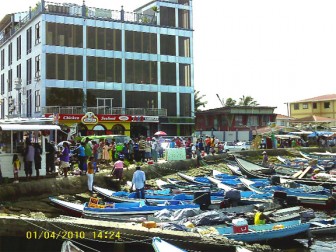Charity’s Monday Market serves as a trading post for buyers and sellers who come from distances as far apart as Georgetown and the small sleepy villages of the North West District. Markets can be much more than places where goods are bought and sold. They are, sometimes, events, outings, familiar meeting places, even places where people entertain themselves. Charity’s Monday Market offers a little bit of everything.’
It is, however, about trading first. If you travel to Charity on Mondays you might see merchants who customarily do business in Georgetown offering sewing machines, generators and fridges for sale. In the same setting, the farmers from Pomeroon do brisk business, offering fruit and vegetables, cultivated on huge farms along the river. Additionally, they offer beverages, primarily coconut water, a reminder that the coconut industry in the Pomeroon is one of the biggest in the country.
Patrick and Genevieve Goocharran reside at Siriki on the banks of the Pomeroon River. They have been selling cassava bread and casareep at Charity for more than ten years. Much of the cassava from which the products are made comes from their own farm. Five hundred pounds of bitter cassava will give them around 500 cassava breads. They sell them at $100 each.

Cassava bread has become a good seller and some of the Pomeroon agro-processors are seeking to expand their production. They are, however, hampered by their inability to acquire the generator-powered mills that would increase production.
The intrepid traders who bring their goods to Charity from the North West District must travel several hours by boat, a circumstance that requires them to depart their homes on Sunday. A woman from Moruca says that her journey usually takes about nine hours. She leaves her home on Sundays, mostly with boatloads of cassava bread and casareep. She starts to trade as soon as she arrives some time on Sunday so that by Monday morning she is ready to make her return journey to Moruca. Then, the boat will be laden with vegetables, chicken, soft drinks and beer and household items to stock the shop she runs at Moruca.
A telltale sign that the volume of trading at Charity Market continues to grow is the keen rivalry for vantage points from which to trade. On the day that this newspaper visited Charity there were more than 300 vendors offering an assortment of goods for sale. Most of them were crowded on the shoulders of the access road while a nearby tarmac built by the regional administration reportedly at a cost of around $21 million was virtually deserted. It appears that the vendors have deemed the tarmac to be a less than ideal vantage point. It is a familiar story that is not unique to Charity. Vendors who had opted to finance stalls at the new facility complain that they are now disadvantaged on account of the more ideal locations of their competitors.
Trading at Charity, however, persists, regardless. In the absence of an official solution some traders hedge their bets, retaining their old roadside positions while persisting with their new investments. Sometimes, the roads are impassable, congested by throngs of traders, shoppers and people who appear unmindful of any other pursuit apart from simply having a good time.
The crowds that find their way to Charity Market on Mondays are not unmindful of the opportunity to entertain themselves. The occasion provides a trading opportunity for the business establishments clustered on the northern side of the road; businesses like the newly established WD’s Hotel and Mall, the Purple Heart Hotel and Bar, the Xenon Hotel and Bar and the impressive five-storey mall operated by Alfro Alfonso and Sons. On the weekend and up to the end of the trading day on Monday, hotel occupancy is up and the bars and restaurants do brisker than usual business.
The market’s administrator, Kavita Perreira, confirms that while most of the fruit and vegetables sold at Charity come from the Essequibo Coast and the Pomeroon, several hardware traders travel from Georgetown. It’s worthwhile business. You pay just $250 for the privilege of trading at Charity.
Eliciting the names of traders can be difficult but they are keen to talk anyway. We met a former Essequibo rice farmer who resides at Golden Fleece and now brings fresh vegetables to market at Charity on Mondays. His venture is sufficiently large to allow him to do both wholesale and retail trading.
Another trader, claiming ownership of a $12 million enterprise with outlets at the Suddie, Anna Regina and Charity Markets complains about congestion at Charity. He wants the vendors to comply with the regulations that require them to occupy the new tarmac. The Vendors, of course, have their own view.
Trading persists at Charity and one might even contend that the market reflects some telltale signs of a measure of affluence. The freshly painted boats that ply the Pomeroon River are fitted with pristine-looking engines. Trucks and vans that arrive from the coast appear to be recent investments. High-priced purchases including music systems and generators by Pomeroon residents are a telltale sign of investment in some new business enterprise or expansion of an existing one.







